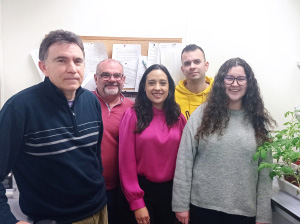Drugs against drought
Researchers from the IBMCP trigger the activation of a phytohormone pathway using genetic-chemical techniques
[ 28/03/2023 ]
A drug to activate the resistance of crop plants to drought. This is what has been developed by a team from the Institute of Molecular and Cellular Biology of Plants (IBMCP), a joint center of the Universitat Politècnica de València (UPV) and the Spanish National Research Council (CSIC), and the Institute of Physical Chemistry Rocasolano (IQFR), also of the CSIC. This is a mechanism for activating at will the signaling of the plant hormone abscisic acid, a critical factor in the adaptive response of plants to water stress. This work applies biomedical techniques to agricultural biotechnology, which has led to a patent. The results are published in Science Advances.
Abscisic acid (ABA) is a plant hormone with essential functions in plant physiology. It is involved in developmental and growth processes and the adaptive stress response. Thus, the plant adaptation to stress situations caused by water deficit can be favored by activating this phytohormone pathway. In this project, the teams led by Pedro Luis Rodríguez at the IBMCP in Valencia and Armando Albert at the IQRF in Madrid developed a genetic-chemical method to activate this route in an inducible way and without penalizing plant growth.
Based on the atomic structure of the proteins involved and using genetic engineering techniques, CSIC researchers have created a modified ABA receptor activated by a mimetic molecule called iSB09. According to the results of their study, now published in the prestigious journal Science Advances, plants carrying this modified receptor and treated with iSB09 show high tolerance to drought. "This combination efficiently activates the ABA pathway and generates protection by triggering the plant's adaptive mechanisms," says Pedro Luis Rodríguez from the IBMCP (CSIC-UPV). "Individually, the iSB09 molecule also reduces water loss by transpiration in tomato plants," he adds.
"This is the first time that an ABA receptor has been modified in crop plants to adapt it to a molecule mimicking the phytohormone," says Armando Albert from IQRF-CSIC. "This molecule is more persistent than the ABA hormone itself, which has a short half-life and can be added at the right time to protect the plant in drought situations," explains the CSIC researcher.
Developing drugs against drought
According to the study, this combination makes it possible to reduce the dose of agrochemicals used on crop plants because the mix with the modified receptor enhances the effect of the molecule. "We aim to improve the plant's resistance to drought and even, in extreme cases, to allow them to survive until irrigation is restored," reveals Pedro Luis Rodríguez. "The aim is to develop drugs against drought by applying the advanced molecular knowledge developed in the plant world," he says.
To carry out this work, the CSIC researchers have used strategies previously applied in the biomedicine field (known as 'drug discovery'), but in this case, transferred to agricultural biotechnology. The method has been protected by a CSIC-UPV patent, as the Institute of Molecular and Cellular Biology of Plants is a joint center.
According to the researchers, "the iSB09 molecule will have to pass food safety studies like any other agrochemical, something that the company that exploits this molecule will be in charge of. The introduction of the modified receptor, like all genetic modification, is pending changes in European legislation, for example, the acceptance of the CRISPR technique in agricultural biotechnology. But companies can use this approach in other countries where it is allowed.
Reference:
Lozano-Juste et al., Structure-guided engineering of a receptor-agonist pair for inducible activation of the ABA adaptive response to drought, Sci. Adv. 9, eade9948 (2023). DOI: 10.1126/sciadv.ade9948
Outstanding news
 The Diamond Army
The Diamond Army
Two students came up with the UPV initiative that has engaged more than 1,600 volunteers and shattered the false myth of the 'crystal generation'
 ARWU 2024
ARWU 2024
The Shanghai ranking reaffirms the UPV as the best polytechnic in Spain for yet another year
 Distinction of the Generalitat for Scientific Merit
Distinction of the Generalitat for Scientific Merit
Guanter has been distinguished in recognition of his research excellence in the development of satellite methods for environmental applications
 The new statutes come into force
The new statutes come into force
The Universitat Politècnica de València is the first university in Spain with statutes adapted to the new LOSU
 NanoNIR project against breast cancer
NanoNIR project against breast cancer
UPV Researcher Carla Arnau del Valle receives an EU Marie Curie grant to develop biosensors for the early detection of this cancer
 Large artificial intelligence language models, increasingly unreliable
Large artificial intelligence language models, increasingly unreliable
According to a study by the Universitat Politècnica de València, ValgrAI and the University of Cambridge, published in the journal Nature





